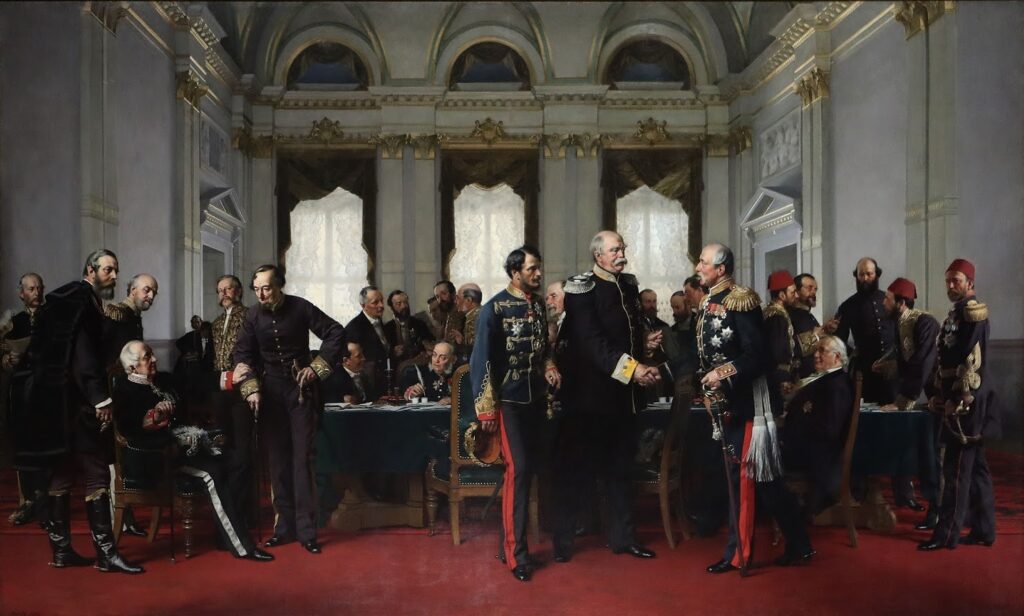If you see this after your page is loaded completely, leafletJS files are missing.

From June 13 to July 13, 1878, the so-called Berlin Congress, chaired by Otto von Bismarck, met in the Reich Chancellor’s Palace.
With the decline of the Ottoman Empire, power-political conflicts had arisen in the Balkans. These were not only significant for local populations and regional ruling regimes, they also aroused the interest of wider contemporary powers. The power vacuum in the Balkans triggered fierce wars, battles and disputes between Ottoman and Tsarist Russia. The Russo-Turkish War of 1877-78 was the main trigger of the Congress of Berlin. Otto von Bismarck, the Chancellor of the German Empire founded in 1871, also saw his role as host and congress leader in this context.
Participants in the congress included the five major European powers – England, France, Germany, Russia and Austria-Hungary – as well as Italy and the Ottoman Empire. The principle of unanimity applied to all substantive decisions at the Congress. The representatives of the Balkan countries, including Greece, Montenegro, Romania and Serbia, were consulted on specific issues. However, they had no voting rights. Conflicts in Balkan regions continued despite or because of the Congress and resulted in the First World War.
The so-called “Armenian question” was also an important point of negotiation. The 1878 Treaty of Berlin on the Future of the Ottoman Empire demanded in Article 61 “reforms” in Armenian provinces and, in particular, improvement of their security “against the Circassians and Kurds.” Despite the treaty and international attention, Armenians:in the years and decades to come were the target of political violence in the Ottoman Empire on several occasions. In 1895-97, the Armenians:inside the Empire who lived in Western Armenia and especially on the Armenian Plateau were massacred. Thousands of Armenians came under Russia’s protection even before the 1915 genocide in Eastern Armenia.
After the Congress of Berlin and in the years that followed, the Ottoman Empire continued to shrink through wars and declarations of independence. The German Empire nevertheless built and maintained excellent ties with the Ottoman regime over the years, including with the Young Turk government from the 1908 revolution and the 1913 coup. In the First World War from 1914 to 1918, they fought side by side and continued to do good business with the Ottomans. They were allies during the genocide, deportations and systematic violence against Armenians. The quotation of the contemporary Chancellor of the Reich, Theobald von Bethmann-Hollweg, on a diplomatic report of December 1915 describes the attitude of the German Empire as follows: “Our only aim is to keep Turkey at our side until the end of the war, regardless of whether the Armenians perish over it or not”.
Sources:
Imanuel Geiss (ed.): Der Berliner Kongress 1878. Protocols and materials. Boldt, Boppard am Rhein 1978, ISBN 3-7646-1729-2 (Schriften des Bundesarchivs 27)
Wolfgang Gust (ed.): Der Völkermord an den Armeniern 1915/16. Documents from the Political Archive of the German Foreign Office. Zu Klampen Publishing House. 2005. Available at: (German, English and Turkish): http://www.armenocide.net
Raymond H. Kévorkian. The Armenian Genocide: A Complete History. I.B. Tauris. 2011
Raymond H. Kévorkian & Paul B. Paboudjian. Les Arméniens dans l’Empire ottoman à la veille du genocide.
Arhis, Paris. 1992. Available at: https://gallica.bnf.fr/ark:/12148/bpt6k33238543/f1.item.texteImage
